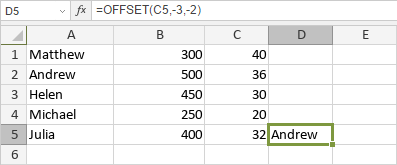OFFSET Function
The OFFSET function is one of the lookup and reference functions. It is used to return a reference to a cell displaced from the specified cell (or the upper-left cell in the range of cells) to a certain number of rows and columns.
The OFFSET function syntax is:
OFFSET(reference, rows, cols[, [height] [, [width]]])
where
reference is a reference to an initial cell or range of cells.
rows is a number of rows, up or down, that you want the upper-left cell in the returned reference to refer to. Positive numbers mean the result will shift below the initial cell. Negative values mean it will shift above the initial cell.
cols is a number of columns, to the left or right, that you want the upper-left cell in the returned reference to refer to. Positive numbers mean the result will shift to the right of the initial cell. Negative values mean it will shift to the left of the initial cell.
height is a number of rows in the returned reference. The value must be a positive number. It's an optional argument. If it is omitted, the function will assume it to be equal to the initial range height.
width is a number of columns in the returned reference. The value must be a positive number. It's an optional argument. If it is omitted, the function will assume it to be equal to the initial range width.
To apply the OFFSET function,
- select the cell where you wish to display the result,
- click the Insert Function
 icon situated at the top toolbar,
icon situated at the top toolbar,
or right-click within a selected cell and select the Insert Function option from the menu,
or click the icon situated at the formula bar,
icon situated at the formula bar,
- select the Lookup and Reference function group from the list,
- click the OFFSET function,
- enter the required arguments separating them by comma,
- press the Enter button.
The result will be displayed in the selected cell.
